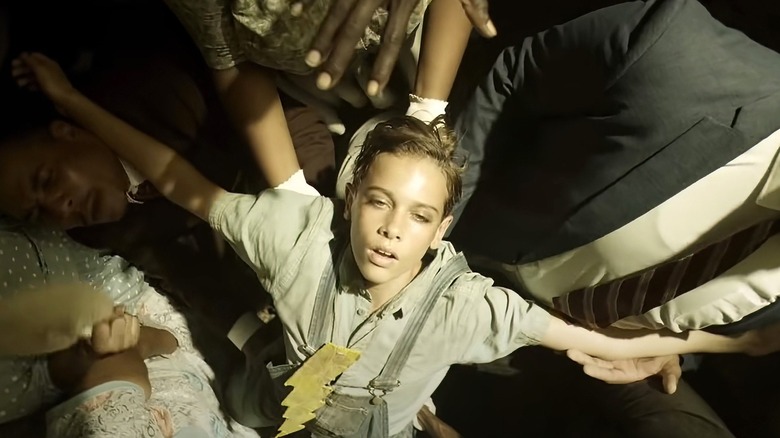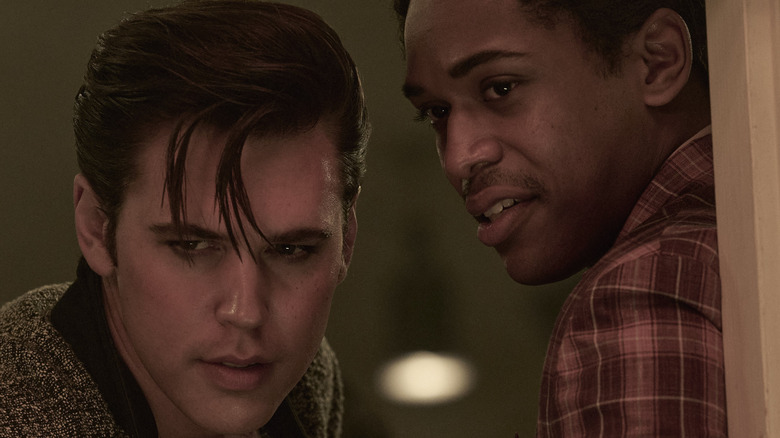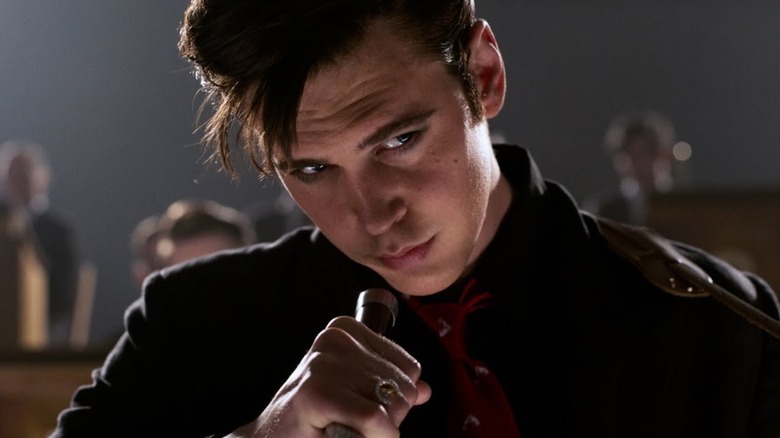Baz Luhrmann 'Mic'd The Floorboards' Of A Church To Get An Authentic Sound During Elvis' Gospel Scenes
Baz Luhrmann's Academy Award-nominated cinematic spectacle "Elvis" is more heavily rooted in reality than meets the eye. The director did extensive research into the singer's backstory to reveal the true and untold details of his past musical influences, especially in the opening scenes of the film. Luhrmann and composer Elliot Wheeler pulled authentic pieces of the South and poured them into every detail of these scenes — particularly, of course, into the score. In a biopic about one of the most famous musicians of all time, what could be more important than the music?
In one of the early moments in "Elvis," the young pop star is introduced to blues in a juke joint, then runs into a tent to listen to gospel. The scene is based on a real-life story told by Elvis' childhood friend, Sam Bell, whom Luhrmann met with prior to filming.
"I mean, Sam Bell told me that story verbatim," the filmmaker revealed, per Warner Bros. Pictures. "And what you see there is Elvis experiencing the spirit [...] But when [he] went to grab him, and the pastor grabs him and says 'Leave him be, he's with the spirit,' I mean, that really happened."
Luhrmann's meeting with Bell would guide his musical choices for "Elvis" as well.
"Sam said that the song 'Fly Away' was one of Elvis' favorite songs," Wheeler recalled. "And that's the song that we use as the backbone of [the song in the gospel tent]."
Authenticity was of the utmost importance to Luhrmann, especially in this early scene, where he would be retelling an intimate story from Elvis' real childhood. Music is a powerful agent of memory, and the director and his composer wanted to make sure that they accessed the sounds of this memory as accurately as possible.
Luhrmann wanted complete audio authenticity
When he was writing and directing "Elvis," Baz Luhrmann was not afraid to immerse himself completely in the project. "We lived these things," he stated matter-of-factly. "I lived in Memphis. I had an office in Graceland for eighteen months."
But perhaps the most important component of the project was finding a way to capture the sounds that influenced the entirety of Elvis' diverse and powerful discography.
"When it came to the music, working with [music producer] Dave Cobb, Elliot and I and the whole team — Dave took us down to Nashville," Luhrmann recalled. "We were finding gospel singers singing in churches and recording."
Cobb wanted to capture every element of the music in those churches. Movement is an important part of gospel, and almost any gospel song would be incomplete without the sounds of clapping and stomping. This aspect of gospel explains the way that music moved Elvis. In an effort to capture this sound accurately, Cobb had to get creative. Luhrmann said:
"Just to give you an idea of how detailed and how passionate everyone was about getting the authenticity, when Dave Cobb mic'd the church, he even mic'd the floorboards. So that in the movie when you see all the members of the Pentecostal tent stomping their feet, it's actually the real gospel singers back in Nashville in the church stomping their feet. He was recording the feet stomping. So we strove to create visual authenticity but that came from the fact that we already had audio authenticity."
This attention to detail is what made "Elvis" such a captivating and evocative film. The visuals and the sounds of the film are perhaps closer to an emotional and maximalist hyperrealism than they are to true aesthetic realism, but they are grounded in the fabric of Elvis' real life.
Gospel was the musical spine of the film
Even the musical moments that seem pretty detached from Elvis' real life are intended to evoke him. For example, Doja Cat was selected to remix the song "Vegas" for the score for one particular reason.
"[Baz Luhrmann] was like, 'Who would you have been listening to, who's a modern equivalent of who, in the 1950s, audiences would've been listening to?'" Wheeler recalled in an interview with /Film. "'Who's the hottest performer right now? It's Doja Cat.' So, that's where we went."
The director and composer brought an eclectic bunch of sonic influences into the project, which all came together when they composed the film's main theme.
"That was an absolute blast," Wheeler said, "and being able to use all the different shades that we had within the film, orchestral, and gospel, and traditional choral, as well as getting these amazing contemporary artists to come in and perform. Yeah, it was a composer's dream. It's amazing."
Despite the diversity of musical genres in the film, Wheeler and Luhrmann knew that the score had to remain grounded in gospel in order to stay true to Elvis' musical roots.
"I mean right up to the day that he dies at 3 in the morning after two shows he's up at three in the morning with the Sweet Inspirations singing gospel," Luhrmann said (via Warner Bros. Pictures). His connection to gospel, his connection to big singing, his connection to opera actually, was always his go-to safe place. It's remarkable to me that the only time he won a grammy was for a gospel album. And I think that's why [...] early on we talked about how the musical spine should be a gospel musical spine."
Thanks to Baz Luhrmann, Dave Cobb, and Elliot Wheeler's hard work and research, "Elvis" truly captured the essence of his music.


